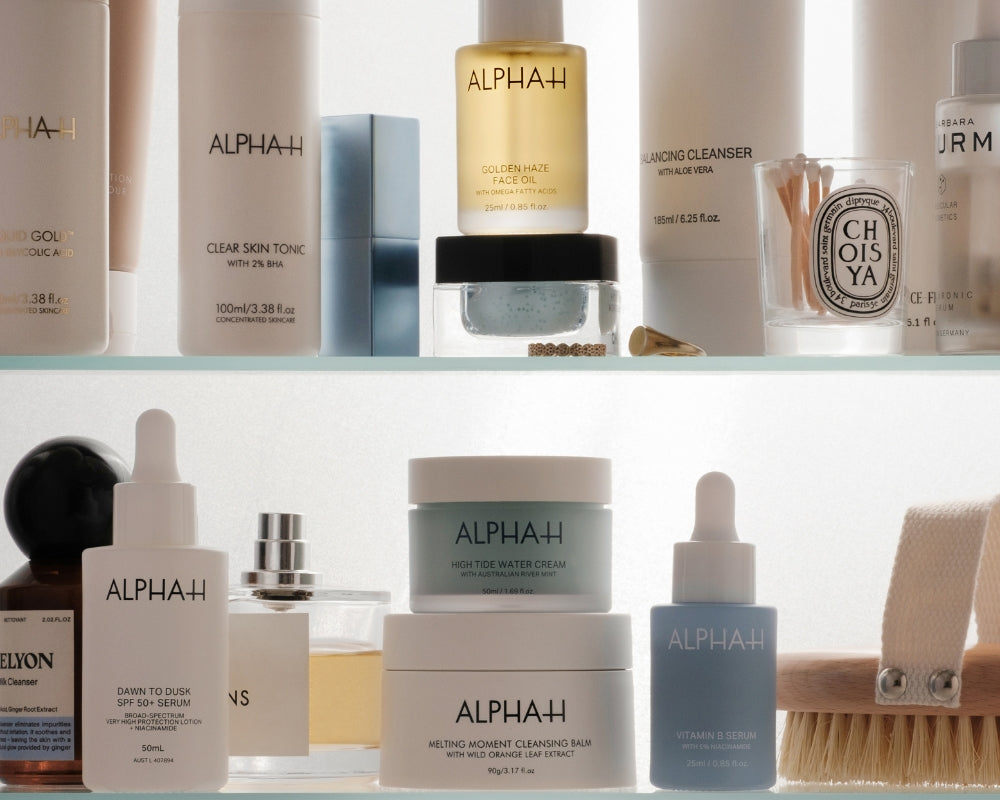An Expert Guide to Skincare: Ingredients, Routines & How to Layer Serums

Are you new to skincare and finding it really confusing?
Or maybe you've bought a bunch of skincare products, but have no idea what to do or how to use them?
If things are sounding familiar, this article is for you!
We asked our clinical skin experts for this easy skincare guide; no fluff, only must-know information.
We'll cover:
- Starting a simple AM and PM skincare routine
- How to layer serums
- Which ingredients and products you can (and really shouldn't) use together
Read on to find out exactly how to make your skincare products work harder and smarter, according to experts.
Morning Skincare Routine Example

AM skincare should prep and protect your skin for the day ahead.
STEP 1: Cleanser to thoroughly cleanse and prep the skin.
- Vitamin C Serum to protect and brighten skin
- Optional: And/or a hydrating serum like Hyaluronic Acid, Niacinamide or Vitamin E over the top for extra nourishment
STEP 3: Moisturiser to hydrate the skin.
STEP 4: Sunscreen to protect skin and prevent visible signs of ageing.
Evening Skincare Routine Example

PM skincare is all about treating your skin concerns and helping your skin recover.
STEP 1: Balm Cleanser to remove makeup and SPF.
STEP 2: Cleanser to thoroughly cleanse and prep the skin.
STEP 3: Treatment + Serum(s) to address your skin concerns.
- Up to 3x per week - Exfoliant OR Vitamin A (Retinol) Serum
- Every other night - Hydrating serums like Hyaluronic Acid, Niacinamide or Vitamin E
STEP 4: Moisturiser and/or Face Oil to hydrate and nourish the skin.
How to Layer Serums

If you want to use more than one serum at once, here's how:
Apply them in order from thinnest consistency to thickest (e.g. water-y serum first, creamy serum second).
What if my serums are all the same consistency, you ask?
Apply them in order of the skin concern you most want to treat:
- Dullness and signs of ageing = Vitamin C Serum
- Dryness and dehydration = Hyaluronic Acid Serum
- Pores, oil, breakouts and texture = Niacinamide Serum
Skincare Ingredients You Can (& Can't) Use Together
Finally, here's a quick rapid fire breakdown of which active skincare ingredients work well together, and which ones don't.
Can you use a Vitamin C Serum and Salicylic Acid together?
- Don't: Layer Vitamin C and Salicylic Acid
- Do: Apply Vitamin C in the morning to maximise its photoprotectant capabilities against environmental damage
- Do: Apply Salicylic Acid at night so the ingredient can work on the skin uninterrupted
Can you use a Vitamin C Serum and Glycolic Acid together? Technically yes, but proceed with caution!
Generally speaking, some forms of Vitamin C (like L-Ascorbic Acid) and Glycolic Acid are not suitable to be layered directly on top of each other.
- Don't: Layer Vitamin C and Glycolic Acid on top of each other... unless you are using a product specifically formulated to combine both ingredients in a safe and effective way
- Do: Ask your dermal therapist for advice, or reach out to skincare brands directly to check if your products are compatible!
- Do: Apply Vitamin C in the morning to maximise its photoprotectant capabilities against environmental damage
- Do: Apply Glycolic Acid at night so the ingredient can work on the skin uninterrupted
Can you use a Vitamin C Serum and sunscreen together? Yes!
- (Please!) wear sunscreen every single morning over the top of your Vitamin C Serum and moisturiser
- Vitamin C + SPF is your best protection against signs of premature ageing

Can you use Vitamin C, Niacinamide and Hyaluronic Acid together? Yes!
- Option 1: Apply Vitamin C and then Hyaluronic Acid in the morning, and Niacinamide at night
- Option 2: Apply Vitamin C in the morning, and Niacinamide OR Hyaluronic Acid at night
Can you use a Vitamin C Serum and a Vitamin A (Retinol) Serum together?
- Don't: Layer Vitamin C and Vitamin A, including Retinol
- Do: Apply Vitamin C in the morning, and Vitamin A/Retinol at night
Can you use Glycolic Acid and Salicylic Acid together?
- Beginner: No - Choose one or the other (Glycolic Acid for signs of premature ageing, Salicylic Acid for pores, breakouts and oil)
- Advanced: Yes, but only when you need to (e.g. you can sub Salicylic Acid into your routine to help with hormonal breakouts or spot treat pimples and visible pores)
Can you use Glycolic Acid and a Vitamin A (Retinol) Serum together?
- Beginner: No - Choose one or the other (Glycolic Acid for dullness and uneven tone/texture, Vitamin A for visible signs of ageing)
- Advanced: Yes - Rather than layering both, try a stronger treatment that combines the two ingredients, like the Alpha-H Midnight Reboot Serum
Can you use Salicylic Acid and a Vitamin A (Retinol) Serum together?
- Beginner: No - Choose one or the other (Salicylic Acid for pores, breakouts and oil, Vitamin A for visible signs of ageing)
- Advanced: Yes, but use Salicylic Acid and Vitamin A on alternating nights to avoid irritation
Can you use Glycolic/Salicylic Acid and Niacinamide together? Yes!
- Option 1: Apply Niacinamide in the morning, and Glycolic/Salicylic Acid at night
- Option 2: Use Niacinamide and Glycolic/Salicylic Acid on alternating nights
Can you use Glycolic/Salicylic Acid and Hyaluronic Acid together? Yes!
- Option 1: Apply Hyaluronic Acid in the morning, and Glycolic/Salicylic Acid at night
- Option 2: Use Hyaluronic Acid and Glycolic/Salicylic Acid on alternating nights
Can you use Vitamin A (Retinol), Niacinamide and Hyaluronic Acid together?
- Don't: Apply multiple serums and ingredients over the top of each other
- Do: Apply Hyaluronic Acid in the morning, and Vitamin A (Retinol) and Niacinamide on alternating nights
And that concludes this guide to the skincare basics!
- Tags: all Skin Science

